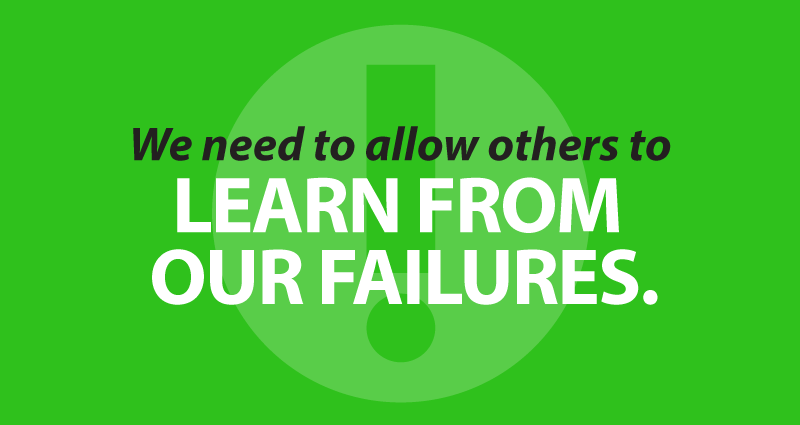
This isn’t working, and I have no idea why.
Would you ever say “this isn’t working, and I have no idea why” to your boss? Never. To your friends and coworkers? Probably not. After all, most of us are programmed that failure is not an option.
Which is crazy.
Lots of good ideas with great potential have failed. Even a few of ours:
• Our CUSoup program was based on the idea that credit union marketers love to collaborate – so why not get non-competing CUs from across the country to work together, develop some amazing creative for common promotions, and split all of the creative costs to save money? A few cool individual campaigns resulted, but mostly it turned out that everyone needs something different at different times.
• CUup2date was a way for smaller credit unions to affordably update their website and get a new redesign every few years by paying a monthly installment, instead of paying for a full redesign all at once. A few nibbles, but no bites.
Both ideas seemed to have plenty of potential, but unfortunately most of the support we received was verbal instead of participatory.
So why is it considered taboo to talk about failure?
Simply put, our society celebrates success, not failure. Awards go to winners, spotlights follow stars, successful people get promoted. Everyone wants to be seen at their best, and failure is the last thing anyone admits.
Even at very close-knit marketing gatherings, failures only get discussed later at night after the wine has been flowing for a while. And it’s the award winners that seem to have the most latitude to talk about what didn’t work – their success is what gives them the freedom to talk about failures.*
Marketers are not the only ones to face failure.
Athletes know that winning seasons are rare, and therefore to be savored and enjoyed. A baseball player that gets on base more than 3 times out of 10 is considered to be very good at what he does. NBA players only make about half of the shots they take, and only if you include those from the free throw line. Get out past the three point line and those numbers drop dramatically.
Researchers, scientists, and inventors are certainly used to running all kinds of tests with mixed results. One of the more famous, Thomas Edison, even has a quote attributed to him (perhaps incorrectly) when questioned about all of his failures:
‘Results! Why, man, I have gotten a lot of results! I know several thousand things that won’t work.’ **
Failures are powerful and valuable, if they’re handled correctly.
Failures can be incredibly valuable launching points for solving problems, once they are seen as an opportunity for defining and refining goals and success. The next time something doesn’t work, take a step back and ask yourself these questions:
What’s worth solving and what’s worth letting go?
So your Big Idea crashed and burned. What can you learn from the wreckage? Failure is the perfect time to honestly re-examine both premise and process. Should we keep moving this direction, slice up our one big goal into smaller goals, or simply give ourselves more time? Did we even have the right goals? The answer may not be immediately obvious, but viewing the bigger picture may allow you to see where you are getting bogged down on the details.
How can someone benefit from my mistake?
At least one researcher is taking Edison’s attitude a step further, asking peers to share their failures, to “learn out loud” as a way to collectively speed up finding solutions. In an era where sharing results is inexpensive and instantaneous, effectively “crowdsourcing Edison’s 10,000 iterations” is a great way to accelerate success without anyone wasting time repeating mistakes someone else has already made.
As the above post’s author points out, “We need to allow others to learn from our failures. Maybe our failure is really a stepping-stone to an even more awesome invention than we could have imagined.”
*Then again, there are many times a marketer, if they’re being completely honest, could say “this worked, and I have no idea why.”
** Paradoxically perhaps, the only reason we know of this quote is that Edison did succeed and become famous.
Also published by CUInsight.
- It’s hard not to get caught up in a buzz that surrounds you. - April 9, 2024
- Turn your staff into an Idea Factory. - February 27, 2024
- Move with the future or get left behind - February 6, 2024
